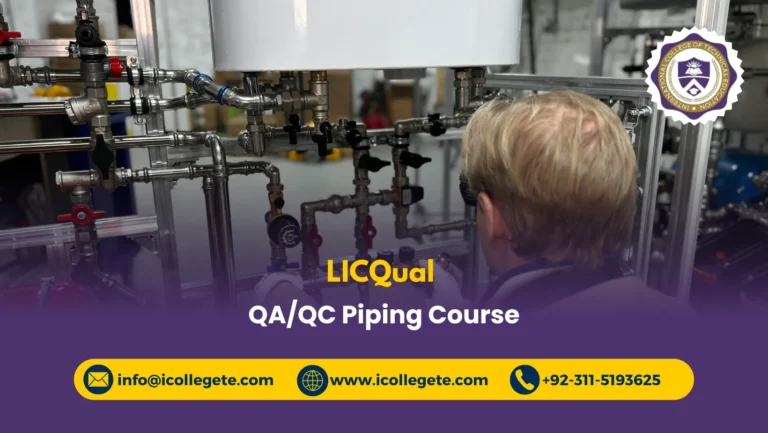In an era where sustainability and compliance define industrial success, the Environmental Management System (EMS) Course in Rawalpindi offers a strategic pathway for professionals and students to gain expertise in environmental governance, ISO 14001 standards, and sustainable operational practices. Environmental Management System Course in Rawalpindi is designed to equip learners with the knowledge and tools needed to manage environmental risks, implement eco-friendly policies, and ensure regulatory compliance across diverse sectors.
Structured around the globally recognized ISO 14001 framework, the Environmental Management System Course in Rawalpindi provides a comprehensive understanding of environmental impact assessment, legal obligations, pollution control measures, and continuous improvement strategies. Participants learn how to develop, implement, and audit environmental management systems that align with international standards and industry expectations.
Ideal for individuals working in manufacturing, construction, public services, and consultancy, the Environmental Management System Course in Rawalpindi combines theoretical instruction with practical case studies to build real-world competence. Delivered in Rawalpindi by experienced trainers, Environmental Management System Course in Rawalpindi supports career advancement in roles such as Environmental Officer, Compliance Auditor, Sustainability Coordinator, and HSE Specialist.
Whether you’re aiming to meet corporate sustainability goals, enhance your professional credentials, or contribute to global environmental efforts, Environmental Management System Course in Rawalpindi offers the foundation you need to lead with responsibility and impact. Enroll today to become part of the solution in shaping a cleaner, safer, and more sustainable future.
Course Overview
The Environmental Management System (EMS) Course in Rawalpindi is a structured, course-level training program designed to build foundational and applied knowledge in environmental governance and operational sustainability. Comprising six focused study units, Environmental Management System Course in Rawalpindi offers a progressive learning experience that equips participants with the tools to understand, implement, and monitor environmental management practices in line with global expectations. Each unit is carefully developed to address key areas such as environmental policy development, risk identification, legal compliance, performance evaluation, emergency preparedness, and continual improvement strategies. Unlike general awareness programs, Environmental Management System Course in Rawalpindi emphasizes system-based thinking, enabling learners to integrate environmental considerations into organizational processes and decision-making frameworks.
The six-unit structure ensures a balanced approach between theoretical understanding and practical application, making Environmental Management System Course in Rawalpindi ideal for professionals across industries including construction, manufacturing, logistics, and public administration. Whether you’re aiming to support corporate sustainability goals, reduce environmental liabilities, or enhance your organization’s compliance posture, Environmental Management System Course in Rawalpindi provides the technical insight and procedural clarity needed to manage environmental responsibilities effectively. Delivered in Rawalpindi by experienced facilitators, the Environmental Management System Course in Rawalpindi is suitable for both entry-level professionals and those seeking to formalize their environmental management skills. Environmental Management System Course in Rawalpindi also serves as a stepping stone toward more advanced environmental certifications and audit roles. With a strong focus on real-world implementation and regulatory alignment, the Environmental Management System Course in Rawalpindi prepares learners to contribute meaningfully to environmental performance and organizational resilience.
Course Study Units
- Environmental Policy and Planning
- Legal and Regulatory Compliance
- Environmental Risk Assessment and Control
- ISO 14001 Framework and Implementation
- Monitoring, Measurement, and Performance Evaluation
- Internal Auditing and Continuous Improvement
Learning Outcomes for this course
Understanding Environmental Management Principles
- Define the purpose and scope of an Environmental Management System (EMS)
- Recognize the importance of sustainability in industrial and organizational contexts
- Understand the relationship between environmental performance and business operations
- Identify key environmental aspects and impacts within a workplace or project site
- Explore the role of leadership and employee engagement in environmental management
- Learn how EMS supports legal compliance and corporate responsibility
- Appreciate the global relevance of ISO 14001 standards in environmental governance
Applying ISO 14001 Framework
- Interpret the structure and clauses of ISO 14001:2015
- Understand the Plan-Do-Check-Act (PDCA) cycle in EMS implementation
- Learn how to establish environmental objectives and performance indicators
- Develop procedures for operational control and emergency preparedness
- Integrate ISO 14001 requirements into existing organizational systems
- Monitor and measure environmental performance using ISO-aligned tools
- Prepare for ISO 14001 certification audits and external assessments
Conducting Environmental Risk Assessment
- Identify environmental hazards and assess associated risks
- Use risk evaluation methods to prioritize environmental controls
- Develop mitigation strategies for pollution, waste, and resource consumption
- Understand the role of risk assessment in EMS planning and review
- Apply risk-based thinking to environmental decision-making
- Document risk findings and integrate them into EMS procedures
- Support continuous improvement through proactive risk management
Ensuring Legal and Regulatory Compliance
- Understand key environmental laws and regulations applicable in Pakistan and internationally
- Learn how to track and interpret legal updates affecting EMS operations
- Develop compliance registers and legal obligation matrices
- Implement procedures to meet environmental permit and reporting requirements
- Prepare documentation for regulatory inspections and audits
- Identify non-compliance risks and corrective action pathways
- Promote a culture of legal accountability within the organization
Managing Environmental Documentation and Records
- Create and maintain EMS documentation including policies, procedures, and manuals
- Learn best practices for recordkeeping and data management
- Ensure traceability and transparency in environmental reporting
- Support audit readiness through organized documentation systems
- Use digital tools to manage environmental records efficiently
- Align documentation practices with ISO 14001 requirements
- Facilitate internal and external communication through accurate records
Monitoring and Evaluating Environmental Performance
- Establish key performance indicators (KPIs) for environmental objectives
- Conduct internal audits to assess EMS effectiveness
- Analyze data trends to identify areas for improvement
- Use performance reviews to guide strategic environmental planning
- Report findings to stakeholders and management teams
- Support decision-making with evidence-based evaluations
- Drive continual improvement through performance feedback loops
Promoting Sustainable Practices and Culture
- Encourage resource conservation and waste reduction initiatives
- Support energy efficiency and pollution prevention programs
- Engage employees in environmental awareness and training activities
- Integrate sustainability goals into daily operations and project planning
- Collaborate with suppliers and contractors on green practices
- Measure the impact of sustainability efforts on organizational outcomes
- Foster a long-term commitment to environmental stewardship
Entry Requirements for this course
- Age Requirement
- Applicants must be at least 18 years old at the time of enrollment. This ensures readiness for professional training and the ability to participate in field-related activities.
- Educational Qualification
- Minimum qualification is Matric (10th grade) or equivalent. Preference is given to candidates with Intermediate, DAE, or higher education in science, environment, or technical disciplines.
- Work Experience
- No prior experience is mandatory, but individuals with 1–2 years of experience in construction, manufacturing, HSE, or administrative roles will benefit from faster skill integration and practical relevance.
- Language Proficiency
- Basic understanding of English or Urdu is required to follow course materials, participate in discussions, and complete written assessments. Instruction is typically bilingual for accessibility.
- Physical and Mental Readiness
- Candidates should be physically fit and mentally prepared to engage in site visits, documentation tasks, and group activities related to environmental monitoring and compliance.
- Documentation Requirements
- Applicants must submit a copy of their CNIC, academic certificates, and two recent passport-sized photographs. These documents are required for registration, certification, and recordkeeping.
- Technical Interest or Career Intent
- Individuals with a strong interest in sustainability, environmental protection, or compliance roles are encouraged to apply. This course is ideal for those seeking career growth in eco-regulatory fields.
- Digital Literacy
- Basic computer skills are recommended for accessing course materials, preparing reports, and using environmental management software tools introduced during training.
Course Benefits of this course
Professional Skill Enhancement
- Gain specialized knowledge in environmental management systems and ISO 14001 standards
- Develop the ability to identify and control environmental risks in various industries
- Learn to implement structured environmental policies and procedures
- Improve technical documentation and reporting skills for compliance and audits
- Build confidence in conducting internal environmental audits
- Understand the role of EMS in organizational sustainability and legal compliance
- Strengthen analytical thinking for environmental performance evaluation
- Enhance decision-making through risk-based environmental planning
- Prepare for roles that require environmental oversight and regulatory alignment
Career Advancement Opportunities
- Qualify for positions such as Environmental Officer, EMS Coordinator, or Compliance Auditor
- Increase your employability in construction, manufacturing, logistics, and public sector projects
- Meet employer requirements for ISO 14001-trained personnel
- Gain recognition for your ability to manage environmental responsibilities
- Open pathways to consultancy and freelance environmental inspection roles
- Build credentials for international job markets and sustainability-focused organizations
- Position yourself for promotion within HSE and quality departments
- Add value to your resume with a globally relevant certification
- Support career transitions into environmental compliance and sustainability roles
Regulatory and Legal Compliance Readiness
- Understand national and international environmental laws and regulations
- Learn how to maintain legal registers and compliance documentation
- Prepare for regulatory inspections and third-party audits
- Reduce organizational risk through proactive compliance strategies
- Support permit applications and environmental reporting requirements
- Identify non-compliance issues and implement corrective actions
- Promote a culture of legal accountability and transparency
- Align organizational practices with environmental legislation
- Contribute to safer and more responsible project execution
Organizational Sustainability Support
- Help organizations reduce environmental impact and improve resource efficiency
- Support the integration of sustainability goals into operational planning
- Encourage waste reduction, energy conservation, and pollution control initiatives
- Facilitate stakeholder engagement in environmental programs
- Monitor sustainability performance using measurable indicators
- Promote continuous improvement in environmental practices
- Contribute to corporate social responsibility (CSR) efforts
- Strengthen brand reputation through environmental stewardship
- Align business strategies with global sustainability frameworks
Practical and Applied Learning
- Participate in case studies and real-world EMS implementation scenarios
- Gain hands-on experience with environmental documentation and audit tools
- Learn through interactive sessions and group activities
- Apply ISO 14001 principles in simulated workplace settings
- Understand how to conduct site assessments and environmental reviews
- Practice preparing environmental objectives and action plans
- Use digital tools for monitoring and reporting environmental performance
- Receive guidance from experienced trainers with field expertise
- Build practical competence for immediate workplace application
Cross-Sector Relevance
- Applicable to professionals in construction, manufacturing, energy, logistics, and public services
- Supports roles in both private and government sectors
- Valuable for NGOs and development organizations managing environmental projects
- Enhances capabilities for consultants and technical advisors
- Useful for educators and trainers in environmental and HSE disciplines
- Supports integration of EMS into diverse operational environments
- Builds transferable skills for multi-industry application
- Encourages collaboration across departments and functions
- Prepares learners for dynamic and evolving environmental challenges
Certification and Recognition
- Receive a professional certificate upon successful completion of the course
- Certification recognized by employers and regulatory bodies across Pakistan
- Validates your knowledge and practical skills in environmental management
- Enhances credibility in client-facing and compliance roles
- Supports career progression and professional development
- Can be used to fulfill training requirements for ISO 14001 implementation
- Adds value to existing technical or HSE qualifications
- Demonstrates commitment to environmental responsibility
- Strengthens your professional identity in sustainability and compliance
Long-Term Professional Value
- Builds a foundation for lifelong learning in environmental governance
- Supports future specialization in auditing, compliance, and sustainability leadership
- Encourages continuous improvement and innovation in environmental practices
- Contributes to safer, cleaner, and more efficient workplaces
- Helps organizations meet global environmental expectations
- Reinforces ethical and responsible decision-making
- Promotes resilience in project planning and execution
- Supports integration of environmental goals into strategic planning
- Positions you as a proactive contributor to environmental excellence
Who Should Enroll in this course
- Fresh Graduates in Environmental Sciences Individuals who have recently completed degrees or diplomas in environmental science, biology, or related fields and want to enter the sustainability and compliance sector.
- DAE Holders in Civil, Mechanical, or Chemical Engineering Diploma holders seeking to expand their technical qualifications with environmental management skills relevant to industrial and construction settings.
- Health, Safety, and Environment (HSE) Officers Professionals already working in HSE roles who need formal EMS training to enhance their compliance and audit capabilities.
- Quality Assurance and Compliance Staff Employees responsible for maintaining quality systems who want to integrate environmental standards into their existing frameworks.
- Construction Site Supervisors and Engineers Field professionals managing infrastructure projects who must ensure environmental compliance and risk control on-site.
- Manufacturing and Industrial Technicians Workers in production environments aiming to reduce environmental impact and meet regulatory obligations.
- Government and NGO Project Staff Personnel involved in public sector or development projects requiring environmental monitoring and reporting skills.
- ISO 14001 Implementation Teams Members of organizations preparing for ISO 14001 certification who need practical knowledge of EMS structure and documentation.
- Environmental Consultants and Auditors Freelancers and professionals offering advisory services who want to formalize their expertise with structured EMS training.
- CSR and Sustainability Coordinators Individuals managing corporate social responsibility programs who need to align initiatives with environmental standards.
- Facility Managers and Operations Supervisors Staff overseeing buildings, plants, or logistics centers who must ensure environmental compliance and resource efficiency.
- Educators and Trainers in Technical Fields Teachers and instructors looking to update their curriculum with EMS content and ISO 14001 principles.
- Legal and Regulatory Officers Professionals involved in environmental law or compliance who benefit from understanding EMS frameworks and audit procedures.
- Procurement and Supply Chain Managers Individuals responsible for vendor selection and material sourcing who need to evaluate environmental risks and sustainability criteria.
- Environmental Activists and Advocates Community leaders and campaigners seeking formal training to support policy development and awareness initiatives.
- Project Managers in Industrial Sectors Managers overseeing large-scale operations who must integrate environmental planning into project execution.
- Technical Sales and Support Staff Employees in product support or sales roles who benefit from understanding environmental specifications and compliance requirements.
- Students Preparing for International Careers Learners targeting overseas employment where EMS knowledge and ISO 14001 certification are valued by employers.
- Administrative and HR Professionals Staff involved in organizational policy development who want to contribute to environmental governance and training programs.
- Career Switchers from Non-Technical Backgrounds Motivated individuals from other fields seeking entry into environmental management through structured, accessible training.
Future Progression of this course
Progression to Advanced Environmental Certifications
- Pursue ISO 14001 Lead Auditor certification for deeper audit and compliance responsibilities
- Enroll in specialized short courses on environmental impact assessment (EIA) and sustainability reporting
- Obtain certifications in waste management, pollution control, or energy efficiency practices
- Explore training in ISO 45001 (Occupational Health & Safety) to complement EMS knowledge
- Join workshops on climate risk management and environmental policy development
- Build eligibility for roles in third-party environmental auditing and consultancy
- Strengthen credentials for working with international environmental standards and frameworks
- Prepare for advanced roles in environmental compliance and regulatory coordination
Transition into Environmental Compliance Roles
- Qualify for positions such as Environmental Compliance Officer or EMS Coordinator
- Take responsibility for ensuring legal and regulatory adherence in industrial projects
- Monitor environmental permits, licenses, and reporting obligations
- Support internal audits and corrective action planning
- Collaborate with legal teams on environmental documentation and risk mitigation
- Contribute to policy enforcement and stakeholder communication
- Lead compliance reviews and gap assessments within organizations
- Assist in preparing for government inspections and third-party audits
Entry into Sustainability and CSR Functions
- Join corporate sustainability teams focused on environmental performance and reporting
- Support CSR initiatives aligned with environmental goals and community engagement
- Contribute to sustainability strategy development and implementation
- Monitor key performance indicators related to resource use and emissions
- Assist in preparing sustainability reports and disclosures
- Promote green practices across departments and supply chains
- Engage with vendors and partners on sustainable procurement standards
- Participate in awareness campaigns and employee training programs
Advancement in Health, Safety, and Environment (HSE) Departments
- Take on broader responsibilities in HSE roles with added environmental oversight
- Support integration of EMS into workplace safety protocols
- Conduct joint safety and environmental audits for operational improvement
- Develop emergency response plans with environmental risk considerations
- Monitor environmental hazards and contribute to risk assessments
- Align HSE documentation with ISO 14001 and ISO 45001 standards
- Train staff on environmental safety procedures and compliance
- Collaborate with safety officers to ensure holistic risk management
Opportunities in Environmental Auditing and Inspection
- Work with inspection agencies or certification bodies as an EMS auditor
- Conduct environmental site assessments and compliance evaluations
- Prepare audit reports and recommend corrective actions
- Verify documentation and operational practices against ISO 14001 standards
- Participate in supplier audits and vendor evaluations
- Support organizations in pre-certification readiness and audit closure
- Build expertise in audit planning and execution
- Offer freelance or contract-based auditing services to multiple clients
Expansion into Environmental Consultancy
- Provide advisory services for EMS implementation and improvement
- Assist businesses in achieving ISO 14001 certification and legal compliance
- Develop customized environmental policies and procedures for clients
- Conduct gap analyses and recommend system upgrades
- Support small and medium enterprises in building environmental capacity
- Deliver training sessions and workshops on EMS and sustainability
- Collaborate with NGOs and development agencies on environmental projects
- Build a portfolio of consultancy engagements across sectors
Integration into Project and Operations Management
- Contribute to environmental planning in construction, manufacturing, and infrastructure projects
- Monitor environmental KPIs during project execution
- Ensure alignment of project activities with EMS objectives
- Support documentation and reporting for environmental milestones
- Participate in project handover and commissioning processes
- Coordinate with cross-functional teams on environmental deliverables
- Assist in resource optimization and waste reduction strategies
- Strengthen project outcomes through proactive environmental oversight
Pathway to Technical Training and Instruction
- Qualify to deliver EMS training at vocational institutes or corporate settings
- Develop instructional materials and case studies for environmental courses
- Guide learners in practical EMS implementation and audit preparation
- Conduct seminars and awareness sessions for industry professionals
- Mentor junior staff and trainees in environmental roles
- Support curriculum development for sustainability and compliance programs
- Build recognition as a subject matter expert in environmental management
- Contribute to workforce development in green and regulatory sectors
Conclusion
The Environmental Management System Course in Rawalpindi offers more than technical instruction—Environmental Management System Course in Rawalpindi fosters a mindset of accountability, foresight, and strategic thinking. In today’s climate-conscious world, organizations are not only expected to meet environmental standards but to lead with purpose. Environmental Management System Course in Rawalpindi empowers learners to become part of that leadership, equipping them with the tools to influence operational decisions, shape responsible policies, and contribute to long-term environmental resilience.
What makes Environmental Management System Course in Rawalpindi distinctive is its emphasis on system integration and practical relevance. Participants learn to view environmental management not as a standalone task, but as a core function that intersects with safety, quality, and organizational performance. The Environmental Management System Course in Rawalpindi encourages learners to think beyond compliance, exploring how environmental stewardship can drive innovation, reduce costs, and enhance stakeholder trust.
Whether you’re entering the workforce or expanding your professional scope, Environmental Management System Course in Rawalpindi prepares you to engage with environmental challenges confidently and constructively. It’s designed for those who want to make a measurable impact—on their careers, their organizations, and the communities they serve. By completing the Environmental Management System Course in Rawalpindi, you join a growing network of professionals committed to shaping a more sustainable and responsible future. Environmental Management System Course in Rawalpindi is not just a qualification—it’s a catalyst for change.
Take the Next Step Toward Environmental Management System Course in Rawalpindi – Enroll Now





